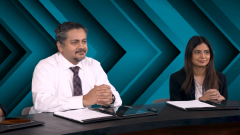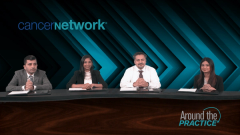
Frontline Therapy for Transplant-Ineligible Multiple Myeloma
An overview of treatment regimens available for patients with newly diagnosed multiple myeloma who are ineligible for stem cell transplantation.
Episodes in this series

Saad Z. Usmani, MD: I’d like to move on to the transplant-ineligible patients now. I will ask Dr Shah about the first-line treatment options for transplant-ineligible patients. Can you talk a bit about those?
Urvi Shah, MD: I think as we have more data coming along, we have options for the transplant-ineligible patients and it is now a discussion as well. RVD-lite [lenalidomide (Revlimid), bortezomib (Velcade), and dexamethasone] used to be the standard that a lot of doctors used across the United States, where they would do reduced-doses of Revlimid and Velcade with a 35-day cycle or adapted to a 28-day cycle. This was based on a small study from Massachusetts General Hospital in Boston, Massachusetts. Now, with the new phase 3 randomized study, the MAIA study, we also see that there’s an overall survival benefit with this and I think that’s a very valid option for patients. That study looked at daratumumab [Darzalex], lenalidomide, and dexamethasone compared to lenalidomide and dexamethasone. Then the third study, which is a randomized phase 3 study in the transplant-ineligible group, is looking at ixazomib [Ninlaro], lenalidomide, dexamethasone [IRd] compared to lenalidomide, dexamethasone.
This was not a statistically significant study, but there was a clinically significant benefit in some ways. If a patient didn’t want to come in for visits and wanted a completely oral regimen, and you felt like you wanted more than just lenalidomide and dexamethasone, then for those certain patients, maybe ixazomib could be added.
Saad Z. Usmani, MD: Would you think about the high-risk patients when you would consider that?
Urvi Shah, MD: I think I rarely use the ixazomib/lenalidomide/dexamethasone triplet. I recently had a patient who loved to travel and was otherwise fit but refused to come in weekly for treatment. So, for that patient, I think it worked out really well, but if a patient is willing to come in, I would prefer either VRd [bortezomib, lenalidomide, dexamethasone] or DRd [daratumumab, lenalidomide, dexamethasone] for them. I’ll add that many transplant-ineligible patients are obviously frail, and I often see doctors sometimes considering doing a doublet therapy for them, but I would argue that we should try to do a triplet therapy at a reduced dose—each drug at a reduced dose—then do 2 drugs for those. With that, you can start with 1 cycle of a doublet, see how they tolerate it, and then add the next drug with the second cycle.
Saad Z. Usmani, MD: Absolutely. I think the point you’re trying to make here is that it’s the same, heterogeneous disease. It has many different clones and sub-clones. You can’t treat myeloma with a single mechanism of action, but you can combine different mechanisms of action to get them in a dose attenuated fashion so that you can get better outcomes for your patients.
Urvi Shah, MD: Yeah.
Neha Korde, MD: I will say that the IRd combo came in handy during the pandemic in certain cases. Especially around the New York area when the pandemic hit, it was nice to have at least 1 all oral combination using different mechanisms of action, and you didn’t feel like you were only on a doublet. It was a good stand in.
Saad Z. Usmani, MD: Yeah. That’s very interesting. I’ve always been struck by the fact that most of the ixazomib studies, whether it’s in the newly diagnosed or early relapsed setting, have shown some early promise, but that promise hasn’t come through. I think many of us have felt that maybe it’s the weaker of the 3 PIs [proteasome inhibitors]. Another way of looking at this would be if K and V were comparable in the frontline setting, based on the ENDURANCE study. This may be a reasonable replacement for older patients, but may not have the same kick.
Sham Mailankody, MD: I think that’s a good way to put it.
Transcript edited for clarity.
Newsletter
Stay up to date on recent advances in the multidisciplinary approach to cancer.






































